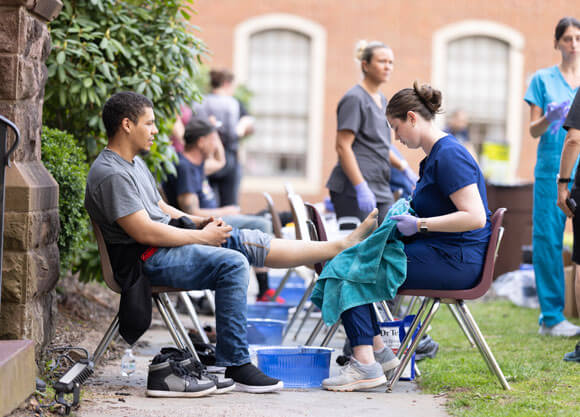
IPE Health Clinic gives students a frontline look at healthcare inequities
June 9, 2025

Experiential learning at Quinnipiac offers multiple opportunities to apply your knowledge through hands-on work, service and exploration, preparing you for success in 21st-century careers. With an abundance of resources, internship opportunities and career-focused guidance, you'll be equipped with the skills and knowledge that distinguish you to employers and pave the way for long-term success.
At Quinnipiac, OT students have many opportunities to gain hands-on experience while providing exceptional care to the local community. From overnight camps to experiential classes, students apply the skills they learned during their time at QU to create activites that enhance the health and well-being of others.
This collaboration includes four separate programs based in Middletown, Connecticut, through a collaboration with the St. Vincent de Paul soup kitchen and the Church of the Holy Trinity. Clients include the unhoused and housing insecure and is community based.
Available Programs
The QUOT Vocational Arts program follows fair trade principles and allows clients to develop work-related skills as well as an opportunity to realize an income while building social capital within the community.
The Occupational Therapy-Based Recovery Program supports existing recovery programming by providing opportunities for meaningful engagement to replace negative habits, establishing healthy daily routines, and creating recovery action plans with weekly check-ins.
The QU OT Leisure Program provides opportunities for the homeless to experience healthy leisure activities that they would not normally be able to afford such as visits to art galleries, movies, fishing, hiking, barbeques, bowling, arts and crafts, yoga classes, meditation, and pet care.
The QU OT Living Skills Program was created to support living independently and prevent evictions by teaching skills such as meal preparation, home management, money management, healthcare management, landlord communication, strategies to address isolation and loneliness, and prevention of hoarding.
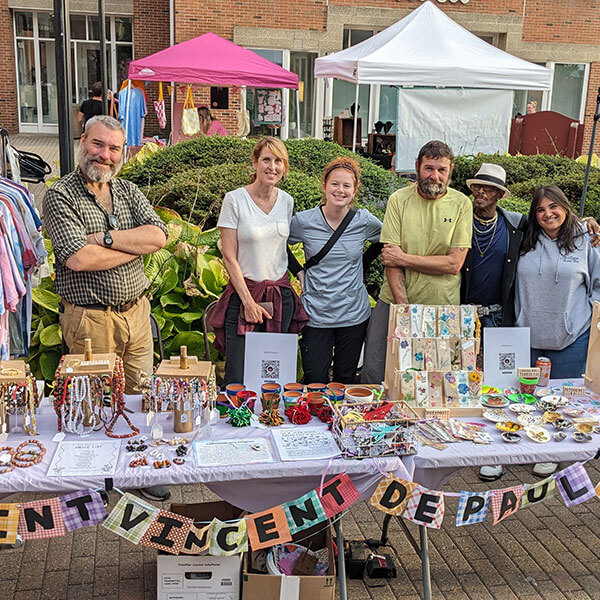

This program is designed for those in the neighboring community who have low vision. The clients are evaluated by an occupational therapist and provided with training and adaptive devices to improve their daily living. The training involves education regarding contrast, lighting, glare and other functional issues associated with low vision. Training is also provided for adaptive equipment and environmental changes to maximize function and safety. All equipment is provided free courtesy of the Lions Club. Students participate in this clinic as schedulers and assistants weekly.
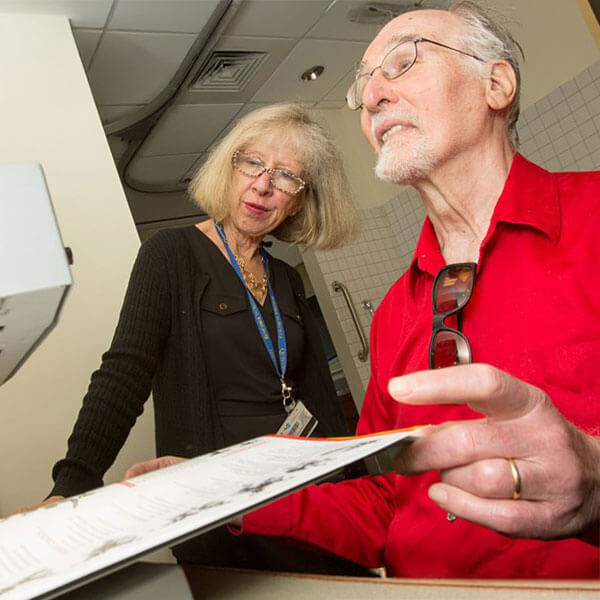

OT students travel with dental hygiene (DH) students and faculty to a small, underserved island in the Bahamas. Students participate in oral health screenings with DH students and provide age appropriate in-class activities that focus on health promotion (physical and emotional) to children in an all-age school.
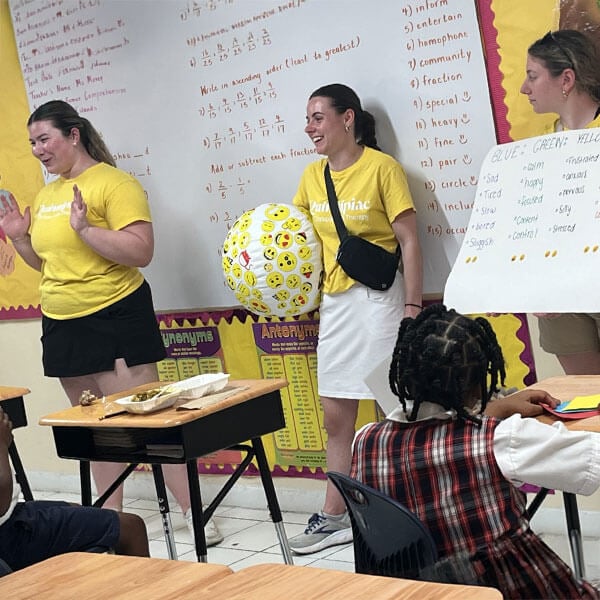

Camp No Limits, sponsored by the M&T Bank Foundation and Hartford HealthCare, offers supportive and inclusive programming for children with limb loss or limb differences, and their families. Within this program, families and children participate in specialized activities, adaptive recreation, and mentorship intended to foster campers’ confidence, independence and development of lifelong friendships. These activities are expertly guided by physical and occupational therapists, prosthetists, Quinnipiac OT/PT students and faculty, in addition to teenage and adult mentors who have personal experiences with limb loss or differences.
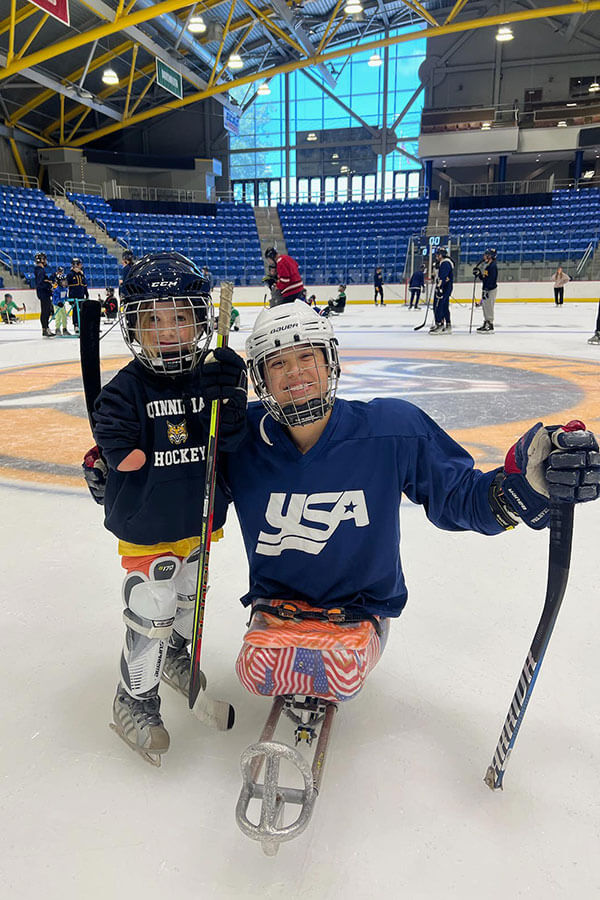

Students in the School of Health Sciences and across Quinnipiac University regularly team up to collaborate with LOF Adaptive Skiers, a Connecticut-based adaptive water and snow ski nonprofit 501(c)(3) organization providing opportunities to individuals living with disabilities. For the past several years, LOF has hosted a lesson-based winter snow ski program at Mount Southington Ski Area in Plantsville, Connecticut.
Students receive training to volunteer with skiers of all ages in winter and summer programs. The LOF volunteers provide opportunities for skiers to achieve personal goals ranging from fun and engagement to competition. In addition, QU students collaborate with LOF to enable families to participate in the program alongside loved ones to promote sustained leisure activities and family bonding.
“It is great for our students to see the participants in a holistic manner, having fun or being competitive like anyone else. It’s really one of the goals of therapy that we rarely get to see,” said Martha Sanders, professor of occupational therapy. “Our students learn a new set of skills to engage the skiers in a fun leisure activity outside the clinic; they are able to witness what they learned in the classroom come to life.”
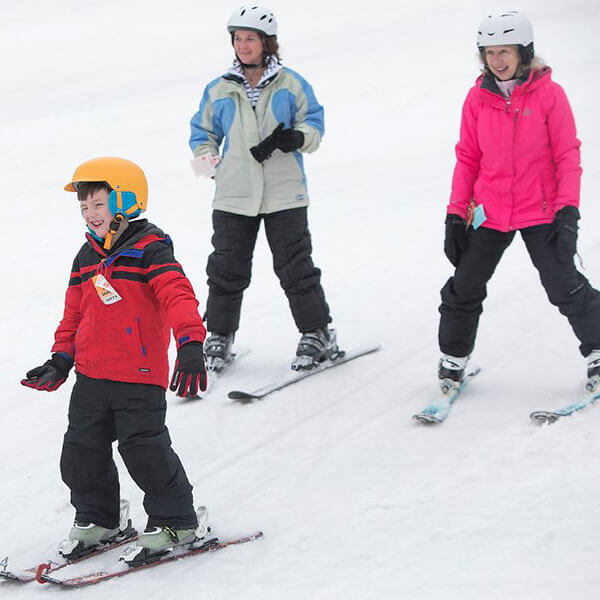

Go Baby Go is a national, community-based research, design and outreach program that provides accessible, inexpensive and common-sense solutions for kids and adults with limited mobility. Occupational therapy students work alongside physical therapy students on interprofessional teams to rewire and repurpose a motorized toy car into a customized vehicle that can enhance a child’s mobility and quality of life.
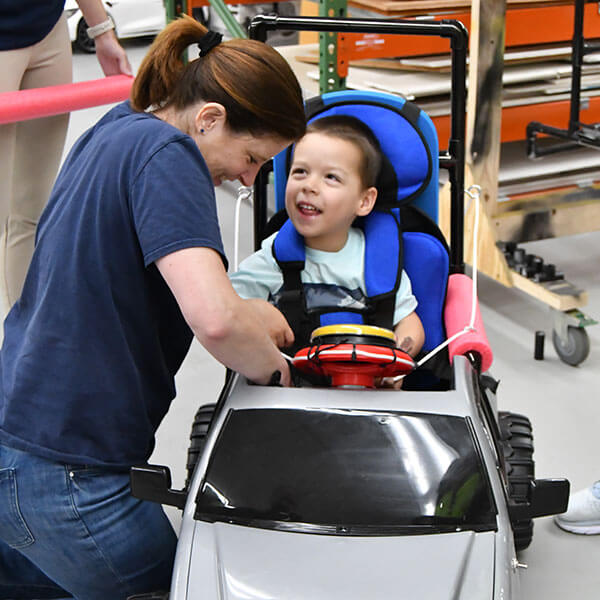

Students in all areas of study can participate in a free, 90-minute virtual information session to learn what it’s like to live with dementia, common myths/facts about dementia, and action steps to create a dementia-friendly community. After gaining an understanding, the students then become advocates in the community. Students interested in dementia can opt for further training to become a Dementia Friend Champion, providing education sessions to their communities.
Occupational therapy students sponsor the CarFit community-based educational program for seniors that helps them learn to adjust their cars to "fit" them. Senior drivers are evaluated and given recommendations on how to best adjust seat belts, seat height, distance from the steering wheel and mirrors.
Occupational therapy students visit elementary schools to educate students on backpack safety to prevent injuries from unsafe use. The students teach children how to pack, wear and adjust backpacks correctly using good posture. These lessons can lower the risks of sustaining injuries due to backpack weight. The students gain a broad world view by observing children of various ages and cultures and classroom management styles. They also become familiar with educating a diverse population while demonstrating leadership, exploring their comfort zone, and analyzing their interest in working with children.
Occupational therapy students taking the course OT 326 — Principles of Human Development: Older Adults —spend two days with volunteers from the AARP organization to learn about ageism and trends on aging in America from the organization, which strives to shape the mindsets of future health care providers who will work with older adult clients. Students find this presentation inclusive, entertaining and interesting.
Selected students live rent-free in apartments within the Masonicare community for two semesters and provide 8 hours of service per week to older adults residing at Masonicare in accordance with Quinnipiac’s academic calendar. The “students in residence” dine with individuals at Masonicare at least once weekly. Both the students and the Masonicare residents benefit from the sharing of wisdom and the intergenerational friendships that develop.

June 9, 2025
Freshmen OT students can opt to live in an OT Living-Learning Community. The goals of this experience are to promote the personal growth and development of students through greater contact with faculty members, one another, and other community resources and expose undergraduates to learning opportunities that take place outside the classroom and reinforce the concept of lifelong learning.
SOTA provides the opportunity for occupational therapy students to lead and participate in multiple activities and events throughout the academic year related to the profession.
Quinnipiac’s OT Student Advisory Board, comprised of two elected representatives of each program/cohort, works to oversee the OT Peer Mentoring program, runs programming that supports student wellness and social cohesion, and liaisons with the OT administration when needed.
Each year to celebrate the culmination of their studies, graduating OT students receive their QU Occupational Therapy pins in respective MOT/OTD ceremonies. Each ceremony is unique, planned by the student cohort it honors, and includes faculty and student speakers. The ceremonies conclude with our graduating students reciting the Occupational Therapy Oath, signifying their transition from student to practitioner.
Quinnipiac is proud to sponsor a chapter of this national organization to address issues of systemic racism and oppression, occupational injustice and healthcare inequity.
Quinnipiac is proud to sponsor a chapter of this national organization. Two students are elected yearly to support student members of AOTA and represent the program at AOTA’s National Conference.
Pi Theta Epsilon (PTE) is a specialized honor society for occupational therapy students and alumni. Its mission is to promote research and scholarship among occupational therapy students. Our Chi Chapter has an active research team which has presented at state and national conferences as well as published research articles in peer-reviewed journals.

With programs offered in 32 countries, your options for learning abroad are varied, and include traditional semester-long programs, short-term programs, global internships, faculty-led courses and global service learning programs.
Many of these opportunities are structured as interprofessional education with students and faculty from various schools and disciplines. Information sessions are typically offered at the beginning of each semester.
The Office of Global Engagement supports students throughout their global education experiences by offering the following services:
Quinnipiac students excel as interns, new hires, managers and executives in almost every industry. Gather real-world data about starting salaries, hiring trends and in-demand skills to inform your decision-making and put you on a path to success.
With an abundance of career-focused information and resources, the career advisers within the School of Health Sciences support students as they expand their professional networks and attract the attention of prestigious employers.
iQ, Quinnipiac University’s holistic approach to career development and experiential learning, surrounds every individual with a personalized plan that maximizes their time at Quinnipiac. The powerhouse of iQ, our Career and Experiential Learning Lab is the physical space where students and advisers bridge the gap between college and career.
Studying and working outside the classroom challenges you — and changes you. These experiences, from competitions and capstones to study abroad opportunities and service outlets, make you more confident, more independent and better prepared for whatever profession you pursue.
Our undergraduate admissions counselors are here to answer any questions you may have and help you navigate the application process.